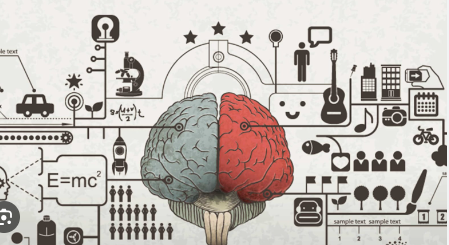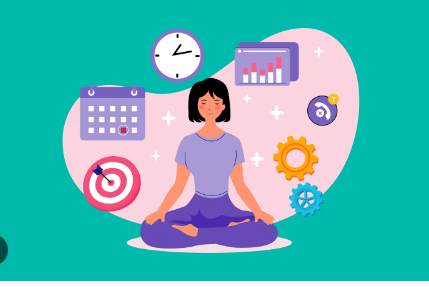In today’s work world, staying focused helps us succeed. Being productive is important at work, especially during reviews. Learning to focus can really improve your work and make you more efficient.
It’s key to focus to do well at work. If we get distracted, we won’t accomplish much. By concentrating, we do better work, feel less stressed, and get more done. Focusing helps finish tasks quicker and do more in the same time. To focus better, look at what distracts you at work. Then, find ways to make your work area better for focusing.
To boost focus and work better, try to enjoy your job. Also, doing one task at a time helps. Make a plan for your day, use good time management, and stay away from social media. A study in 2011 found that being mindful helps with work relationships. Mindfulness means less stress and more happiness at work. It also makes us more resilient and engaged in our jobs.
Brain games like sudoku or puzzles can make your brain work better. Most people who do yoga focus better too. Drinking enough water and exercising are great for your focus. The Pomodoro technique also helps a lot of people focus better at work.
This article will talk about 12 ways to meditate and be more productive. These tips can help you grow professionally and do better at your job.
The Importance of Staying Focused at the Workplace
Maintaining focus at work helps improve employee performance and reach organizational goals. It leads to better work efficiency and more productivity. This happens when everyone stays on task.
Overview of Workplace Productivity
Workplace productivity measures how well people do their jobs. This includes completed tasks, quality of work, and time used. The Pomodoro Technique, which divides work into short 25-minute periods followed by breaks, helps keep focus sharp.
Skipping breaks does more harm than good. It’s important to take breaks regularly to stay focused and work efficiently.
Why Focus Matters
Staying focused helps reduce mistakes and improve the quality of work. Multitasking splits attention and often leads to errors. Using AI tools like ChatGPT for brainstorming or task automation can ease work and enhance goal achievement.
It’s also key to keep checking and adjusting how we work to fit our needs. This can make a big difference in how well employees perform.
Impact of Distractions
Distractions at work slow down productivity. While technology is useful, it can also distract.
It’s crucial to handle distractions to keep efficiency up. Sharing goals and tasks with colleagues can lower distractions. Also, meditation can boost focus and cut down on distractions, making the workplace more productive.
Understanding Mind Wandering
Mind wandering is when our thoughts drift from the task at hand. Researchers at Harvard found that our minds wander 47% of the time. This shows how often we lose focus.
Definition of a Wandering Mind
Mind wandering happens when our attention moves to unrelated thoughts. It’s common during easy tasks or when tasks are too hard. During these times, the brain looks for something more interesting.
Causes of Mind Wandering
Mind wandering happens for many reasons, like being bored or distracted. It involves the brain’s default mode network. Studies show it can make us more creative and smart. A study found that meditation helps the brain notice mistakes better.
Mind-wandering practice is linked with being more creative. It’s key to understand and control this to enhance creativity.
Effects on Productivity
Mind wandering affects productivity by causing mistakes and delays. A study in 2021 found that meditation helps focus better. Spending 20 minutes in meditation improves our mistake detection. This, in turn, boosts productivity.
Improving performance through attention management helps counteract mind wandering.
Meditation to reduce cognitive distractions is important in work focus strategies. It helps us stay on task and be more productive.
Meditation Techniques to Enhance Focus
It’s tough to stay focused in today’s world. But, meditation can help us concentrate better. Let’s look at some meditation techniques that boost focus and productivity.
Mindfulness Meditation
Mindfulness is about living in the now. It makes you aware of thoughts and feelings without judging them. Studies show that people who practice mindfulness are better at focusing. They’re less distracted. Regularly practicing mindfulness reduces stress. It helps you focus on your work more.
Body Scan Meditation
Body scan meditation revolves around noticing your body closely. You mentally scan for any discomfort or tension. This technique improves your focus by increasing awareness of bodily sensations. Zen meditators, who practice body scans, show great focus. They also experience relaxed minds. This method helps in stress relief too.
Breathing Exercises
Breathing exercises can boost your focus and lower stress. Techniques like counting breaths help with concentration. Guided meditation with a focus on deep breathing is helpful. It makes you ready for surprises and sharpens alertness. Beginners find short breathing sessions especially helpful. They’re a good way to start meditating.
Tips for Incorporating Meditation into Your Daily Routine
Making a meditation routine can really make you feel better. To do this, have a set time, a special place, and stick with it. Here are some easy steps to make meditation part of your day.
Setting a Schedule
Start with just a few minutes a day to meditate. Maybe try 10 minutes each morning. This can change your whole day. Also, meditating for 10-30 minutes before bed helps you sleep better. Choose a regular time, like morning or night, for meditation. This helps make it a daily routine. Over time, it boosts focus, lowers stress, and makes you stronger emotionally.
Creating a Meditation Space
Finding a quiet spot for meditation is important. It could be a room corner or a peaceful outdoor place. This special spot tells your brain it’s time to calm down and concentrate. A peaceful setting helps your meditation practice. Using guided meditation apps in your space can also help. A calm environment is essential for keeping up with meditation every day.
Staying Consistent
Being regular with meditation brings many health benefits. It’s good for your heart, memory, and managing feelings. Using apps for guided meditation can keep you on track. Having a friend to meditate with can motivate you too. Writing in a journal after meditating can show your progress. Everyday meditation makes you more focused, less stressed, and healthier overall.
Meditation and Productivity: A Combined Approach
Meditating and being productive together can make work better by using the good parts of both. Microsoft found we get off track every 40 seconds because of digital pop-ups. But meditation helps by growing the brain’s grey matter, making us work smarter and better.
Research shows meditation helps us focus and finish tasks well. It also lowers stress hormones, which makes us healthier and helps us make smarter choices. By calming our busy minds and promoting discipline, we become more mindful in work. This helps us keep being productive over time.
Apps like Headspace and Calm offer guided meditations that help us stay quietly focused. This is key for combining productivity and meditation. Cal Newport’s idea of thinking deeply about work issues while moving helps too. It matches science that says resting our active minds helps solve tough problems.
I started meditating daily for just 5 minutes and now do 15 minutes. Using different techniques has helped me keep a calm mind all day. This has made me more efficient and productive in my work.
Even being a little happier can make us 12% more productive. Meditation brings calm and focus, cutting down stress. When we wander off in thoughts for nearly half our day, staying mindful helps us manage tasks and decisions well.
Practical Time Management Strategies
Effective time management is key in our busy lives. Mixing mindfulness with time management techniques helps a lot. It makes tasks easier to do and lowers the need for redoing them. Knowing how to handle daily activities makes you less stressed and more energetic. It also helps you reach your goals better.
Planning Your Day
Daily planning is vital for managing time well. You can list tasks and set specific times for them. It sharpens your time management skills.
Try the Pomodoro technique, breaking work into short 25-minute chunks with 5-minute breaks. This can make you more focused and productive.
Prioritizing Tasks
It’s important to do the most critical tasks first. Use the Eisenhower Matrix to sort tasks by urgency and importance. This makes your workflow smoother and your time use better. It lets you focus on what really matters.
Allocating Time for Meditation
Adding meditation to your daily routine can improve your brain and work efficiency. Research shows it betters focus, job satisfaction, and task performance. Setting specific times for mindfulness like deep breathing or meditation boosts focus, creativity, and lowers stress.
Using these time management tips can reduce stress, boost your immune system, and make you more emotionally strong. All this leads to better productivity in the long run.
Eliminating Distractions
It’s very important to have a space where you can focus at work. A big part is reducing interruptions. Let’s see how to find the main causes and make a workspace with no distractions.
Identifying Triggers
Many things can distract us at work, like social media and phone alerts. There are over sixty social media platforms. Fifteen have more than 100 million users. The average person uses at least 10 accounts. These accounts take away our focus. Apps now exist to help limit the time we spend on social media.
Trying to do many things at once doesn’t work well. It makes our work scattered. It’s smart to pinpoint what distracts us the most. This could be phone beeps or the TV in the background. TV noise is especially bad. It keeps part of our brain busy when we’re trying to focus.
To deal with distractions, see how much time you’re losing to them each day. Using your phone less when working is a good start. Another tip is to plan your breaks in advance. This keeps your work steady.
Creating a Distraction-Free Workspace
First, organize where you work to avoid interruptions. A clean, pleasing space boosts morale and reduces distractions. Part of this is managing your digital space too. Trim your email subscriptions and keep only helpful social media connections.
Next, turn off the TV and other noises. Choosing streaming over cable can cut down on breaks and bad news. This makes a peaceful space that helps you stay focused.
Practices like meditating and mindful breathing help, too. So does exercising, eating well, and getting enough sleep. These things train your brain to stay focused and lessen distractions.
Getting rid of distractions takes time and effort. Using apps to manage screen time can be useful. Setting strict rules for social media also helps. Most of all, focus on what needs to be done. Creating the right work environment is key to staying focused.
Mental and Physical Benefits of Staying Focused
Staying focused helps work better and makes you happier and healthier. Let’s look at how focus helps our minds and bodies.
Improved Efficiency
Keeping your mind focused makes you do better at work. It makes you work faster and feel better. Studies show that mindfulness meditation helps with anxiety and depression.
This makes people work better. For example, a study showed meditation reduces anxiety. It worked best for those feeling the most anxious. Another study found it helped people with chronic pain feel less depressed, anxious, and in pain.
Boosted Mood and Well-being
Being focused makes you feel better and more stable emotionally. Meditation is known to help with emotional and binge eating. It’s based on a review of 14 studies. Meditation also helps those struggling with stress-related health issues.
It reduces stress and makes you feel less upset. This makes work life better. A special study on loving-kindness meditation showed it increases kindness towards oneself and others. This enhances overall emotional well-being.
Practicing mindfulness leads to a better balance between work and life. This makes you happier and more effective in what you do.
Common Barriers to Focus and How to Overcome Them
Staying focused at work can be hard due to many obstacles. Stress, burnout risk, and distractions are common. Knowing and tackling these issues can make you more focused and productive.
Managing Stress
Handling stress well helps you keep focused. Physical activities lower stress by releasing endorphins and serotonin. Adding exercise to your day can also better your sleep, fighting tiredness. Experts say to sleep seven to nine hours nightly to dodge sleep debt effects. Making realistic goals and breaking them into small tasks helps reduce stress. This makes staying on track simpler.
Avoiding Burnout
Stopping burnout means balancing work and life. Small-business owners often cut sleep for work, which can cause burnout. Focus on sleeping enough to keep productive. Try “Focus Sprints” in teams for better task focus. This stops app switching and email checks. UC Berkeley found this increases productivity by 43%. Short breaks, like walking, freshen your mind and body. This helps you refocus and not get tired.
Handling External Distractions
It’s key to handle distractions to stay focused. About 72% of workers feel they must do many things at once, hurting productivity. Reducing distractions starts with knowing what distracts you. Then, make your workspace free of distractions. A 2016 MIT study suggests checking emails in batches boosts productivity. Also, virtual meeting fatigue sets in after 30 minutes. Thus, keep meetings short or meet in person when you can. This keeps focus sharp.
Conclusion
Today, staying focused at work is more crucial than ever. Over half the employers in the U.S. now teach mindfulness. This shows how important it is. Morning meditations can help IT workers stay sharp. Loving-kindness meditations make call center workers more understanding.
Studies show that people who meditate do better in their careers. They also earn more and do well at school. Famous leaders like Marc Benioff and Steve Jobs say meditation helped them succeed. Just 10 minutes of meditation a day can improve job satisfaction and happiness at work.
Trying out mindfulness can change your life. But remember, what works for one person might not work for another. Adding mindful breathing and grounding exercises to your day can make a big difference. They help you become more focused and productive in work and life.
FAQ
What are the benefits of integrating meditation with productivity techniques?
Meditation with productivity techniques fosters a sharp, efficient mindset. Mindfulness and breathing exercises boost focus. They lessen errors, ease stress, and speed up work. This makes you more productive.
How does staying focused influence workplace productivity?
Focus is key for productivity at work. It’s a main metric in employee reviews. Being focused lowers mistakes, eases stress, and boosts speed. This leads to better performance and growth.
What are some common causes of mind wandering, and how can it impact productivity?
Mind wandering happens during easy or challenging tasks. The brain looks for more engaging activities. This shifts focus away from tasks. Mindfulness and managing attention help bring focus back. They keep productivity up.
Can you describe some effective meditation techniques to enhance focus?
Good meditation techniques for focus are mindfulness, body scans, and breathing exercises. They train the brain to stay in the moment. This reduces mind wandering. It improves focus and productivity at work.
How can one incorporate meditation into daily life practically?
To add meditation to your life, have a set time and place for it. Stay consistent. Regular practice brings mental sharpness and keeps you productive longer.
What is the relationship between meditation and productivity?
Meditation and productivity support each other. Together, they improve focus, efficiency, and output. This combination boosts mental clarity and performance at work.
What are some practical time management strategies for enhancing productivity?
Effective time management includes planning your day, prioritizing tasks, and meditating. These steps keep you focused. They make you more productive.
How can one create a distraction-free workspace?
To avoid distractions, identify and address their sources. Organize your space and set clear rules. Use tools to block off distractions online. This helps keep your focus sharp.
What mental and physical benefits are gained from sustained focus?
Keeping focus improves efficiency and mood. It leads to better balance, happiness, and a healthier life. Your overall well-being gets a boost.
What are common obstacles to maintaining focus, and how can they be overcome?
Stress, burnout risk, and distractions can hinder focus. Managing stress through mindfulness, resting well, and making a good workspace are solutions. They help maintain concentration.

More Posts
10 Useful Skills You Can Learn In Less Than a Week
In today's fast-changing world, learning quickly is key for growing personally and improving yourself. Josh Kaufman, a business expert, says you can learn a new skill in just 20 hours. You can break...
10 Ideas for Increasing Productivity in Your Weekly Workflow
Having a plan for improving workflow and productivity is the key to getting great results without wasting time and resources. By using productivity strategies and improving current processes, teams can beat inefficiencies. This...
9 Time Management Tips from Elon Musk
Time management is different for everyone. It depends on your job, your personality, and what you like. Trying out new methods can help you find balance and be more productive. In this piece,...
Top 9 Time Management Tips for Single Parents
Single parents face many unique challenges. They must balance work, child care, household tasks, and their own health. It is tough for single parents, like a Canadian mother returning to work with an...




